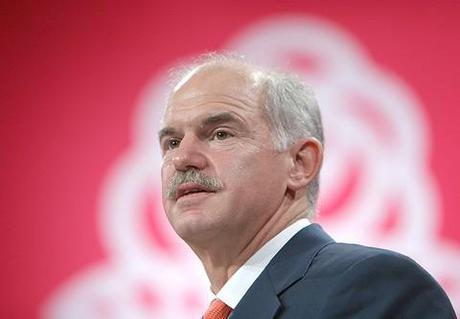
Greek Prime Minister George Papandreou. Photo credit: Parti Socialiste
Following Greek Prime Minister George Papandreou’s shocking and controversial decision to call a nationwide referendum to vote on whether to accept the proposed EU bailout package, fed-up euro leaders have put an ultimatum to the indebted nation: Stay in the currency union or go it alone.
And until that question is answered, said French President Nicolas Sarkozy Thursday at the G20 summit in Cannes, Greece won’t see a single euro more of rescue aid, including the next vital €8 billion installment. According to The Wall Street Journal, without aid, Greece will be bankrupt in weeks. German Chancellor Angela Merkel, the other half of the euro heavyweight team, told reporters at a news conference that though she would prefer to stabilize the euro with Greece on board, the priority was saving the endangered currency, Reuters reported. Papandreou, chastened, agreed to change the referendum from a vote on the unpopular bailout package, which was likely to go “no”, to the question of whether Greece wants to be in the monetary union at all.
Papandreou called the referendum, now scheduled for early December, as increasingly violent public opposition to the series of EU bailouts and the austerity measures they require continued, making Greece virtually ungovernable; he told reporters at the G20, to where he was clearly summoned to explain himself, “This is a question of whether we want to remain in the eurozone. That’s very clear.”
But will the referendum even go ahead?
Risky business. The Wall Street Journal summed up the issue nicely, in its report on the current state of the eurozone: “The call for a referendum, particularly if presented as a question of euro or no euro, is a risky bet. Should the referendum fail, Greece would come unmoored from the euro zone and likely default on its €350 billion ($480 billion) of debt—sending a giant shock wave that could test the resilience of other weakened euro-zone countries. But should it succeed, the Greek government would have a strong mandate to push through austerity measures and proceed with the European Union’s plan.”
Is this referendum actually a victory for democracy? Some think so.
Papandreou on his way out? According to the BBC, Papandreou’s surprise decision to call a vote on the bailout package has made him incredibly unpopular in his own party and looks poised for a defeat in Friday’s confidence vote. Their correspondent suggested that Papandreou will now step aside, though the official word from Papandreou’s camp is that he will not resign; still, calls are mounting for him to clear out. Said Mark Lowen, BBC’s Athens reporter, “If he cannot muster the support of enough opposition MPs, he will lose the vote, the government will collapse and early elections could be called. Greece is now entering a period of intense political instability to add to its financial woes.”
Referendum looking less likely. While markets were in a tailspin following the Greek referendum announcement and the subsequent claim from Sarkozy that funding would be cut-off as Greece mulls its decision, they rallied slightly on rumours that the referendum wouldn’t go ahead, Reuters reported. Those rumours were fueled by the apparent dissension among the Greek ranks, after Greek Deputy PM Evangelos Venizelos’ “bombshell” statement calling Greek’s position in the eurozone an “historic conquest” that “cannot depend on a referendum”. “Kaboom,” declared Sid Varma at the Financial Times’ alphaville blog.
No good options for Greece. Papandreou’s gamble, which looks to be paying him back with nothing but shame and political strife, was a desperate measure in desperate times and “laid bare the miserable economic options the country has in front of it,” John Hudson wrote at The Atlantic Wire. Taking the bailout would further enrage the Greek people, as they watch unemployment rise and public sector cuts bleed them dry; staying in the euro means the Greece has no ability to regulate its currency and try to pull itself out of its financial mire by traditional means; rejecting the bailout, however, could drive up Greece’s borrowing costs in the future, making life also difficult for the Greek people; and leaving the euro and returning the drachma could send inflation skyrocketing.
Deal would have unraveled anyway. The Guardian, in a leading editorial from late Wednesday night, took the dim view that the EU bailout package would have come apart at the seams anyway, regardless of Papandreou’s “plebiscitary bombshell” – “given that Greece cannot pay its way, that the eurozone bank recapitalisation programme is too leisurely, that the bailout fund does not yet exist and that fiscal consolidation, however desirable, still remains a long way off.”
Confidence shaken in economics as a field, even. The epic saga of the Greek crisis, in all its many chapters, is shaking confidence not only in the eurozone, but in economics as a discipline, worried Father Raymond J. De Souza in Canada’s National Post. “The lasting damage of the eurozone crisis is that the whole field of economics and public finance will be viewed as a forum for manipulation and mendacity. The elegant but hard truths of economics will be replaced by alluring evasions and the convenient half-truths of the day.” Thanks, Greece.

